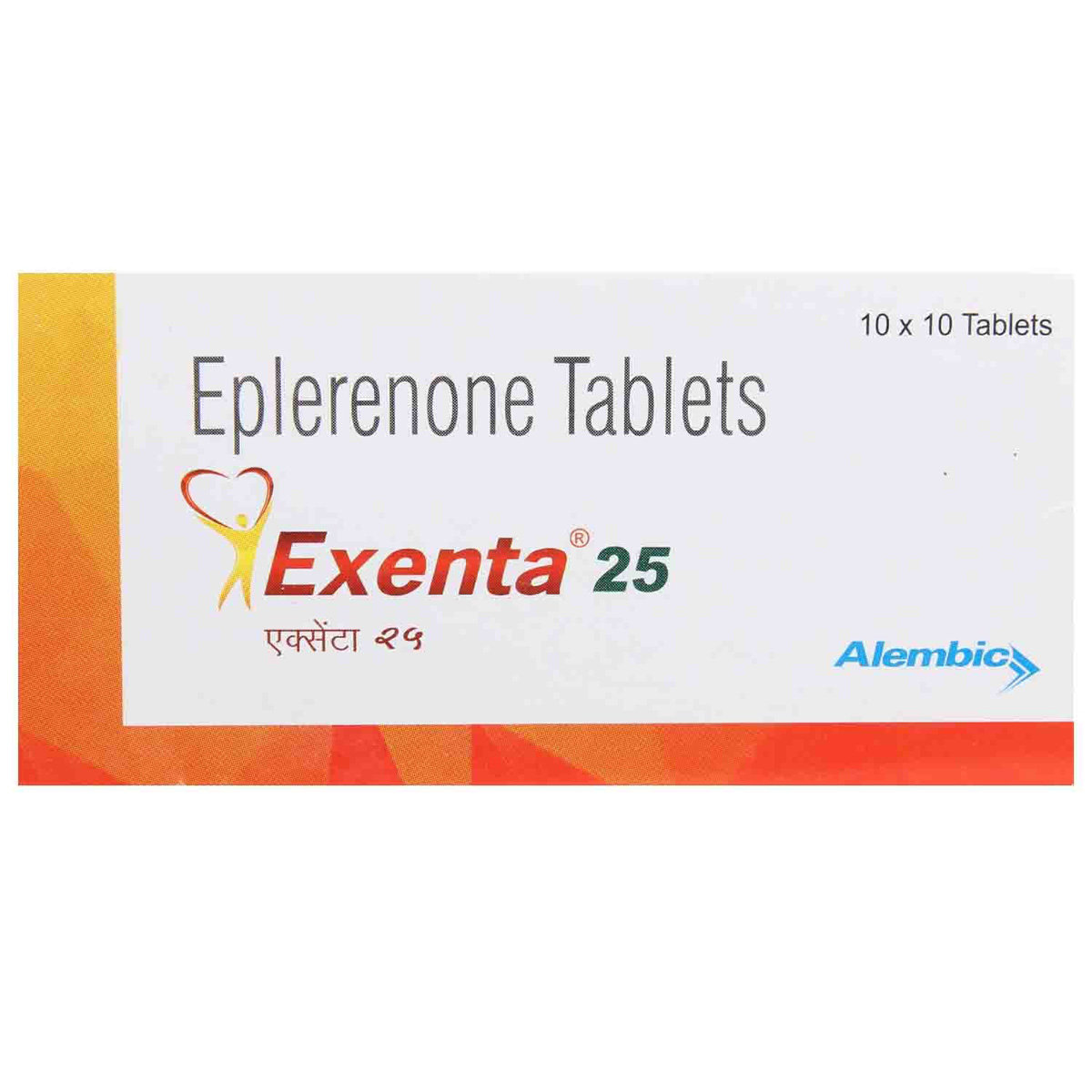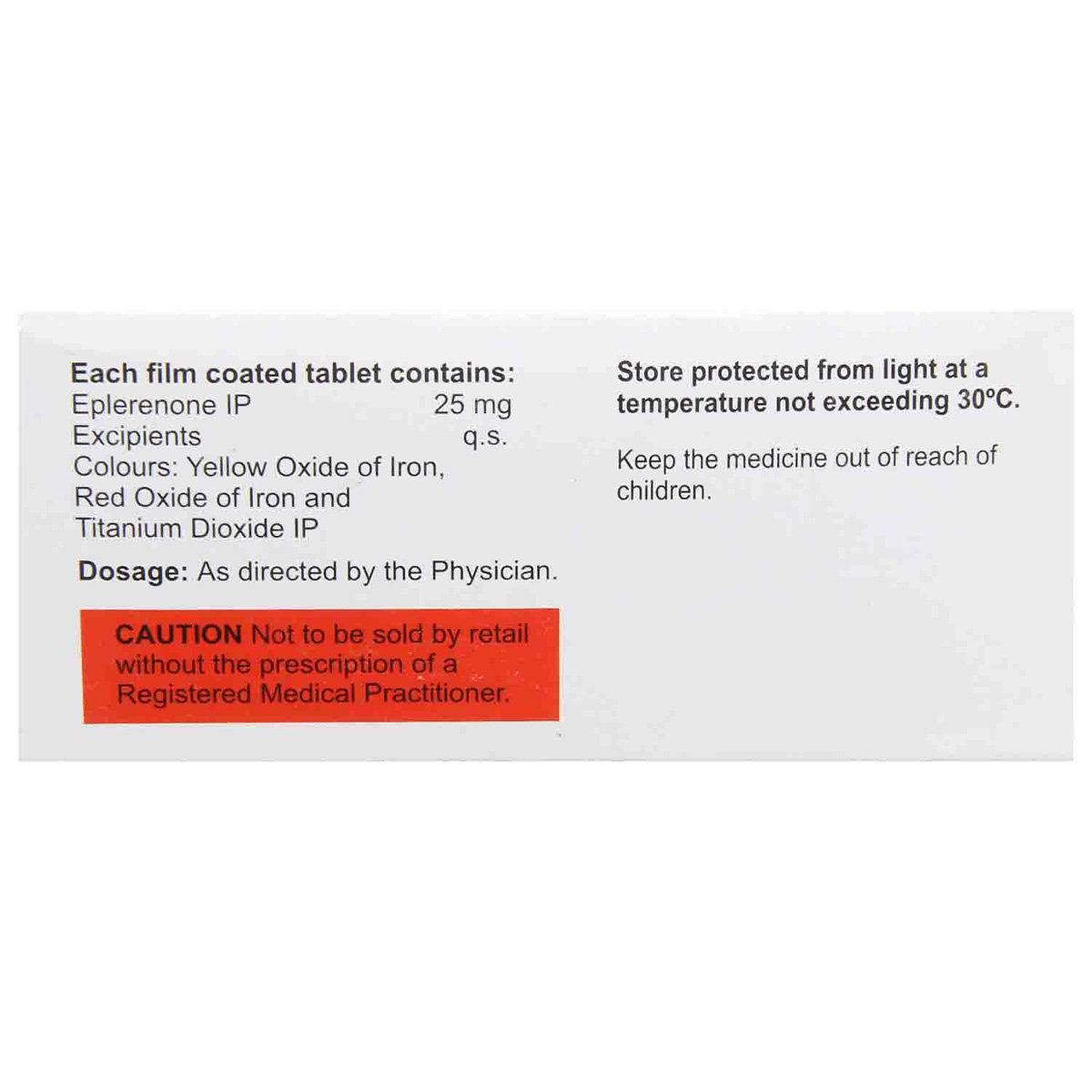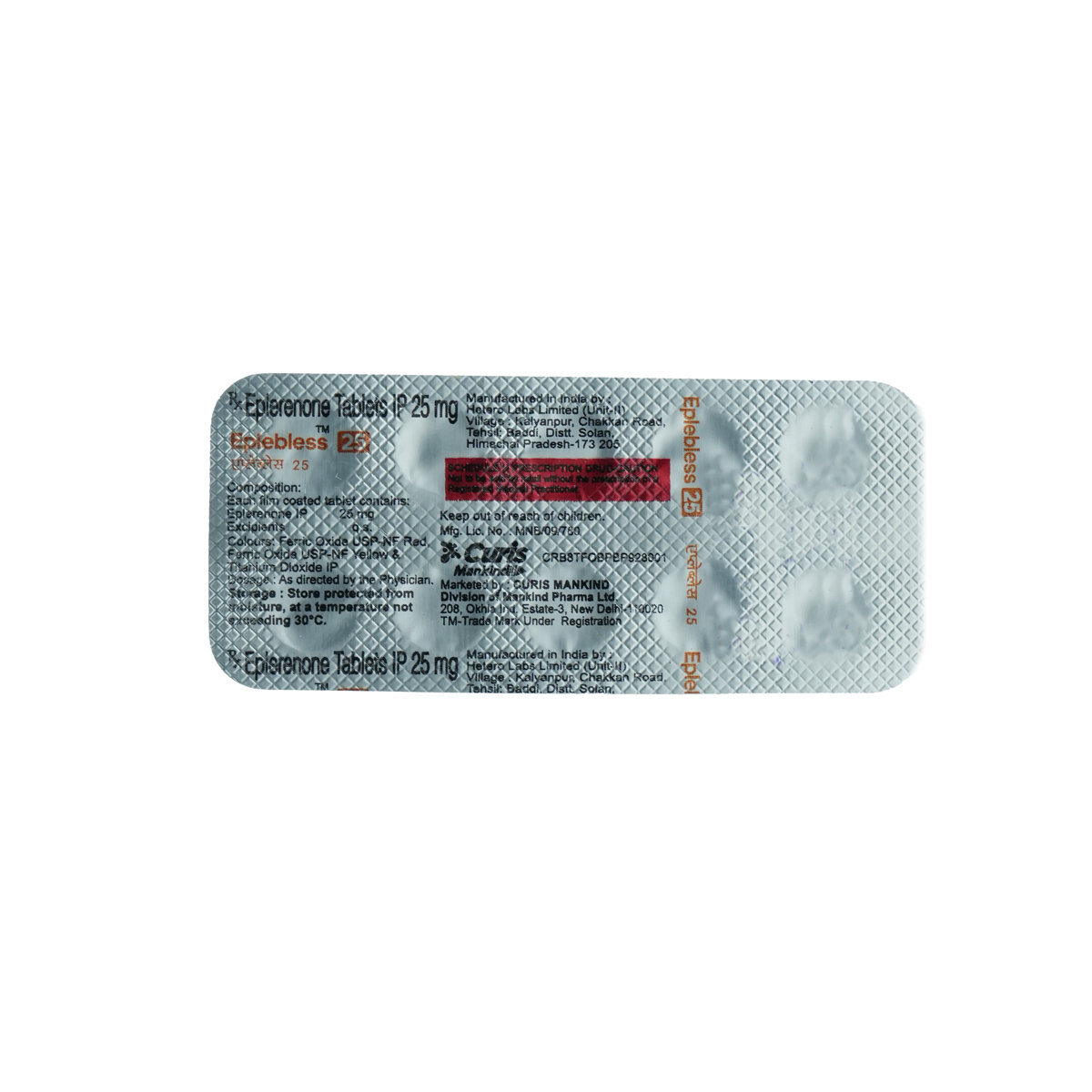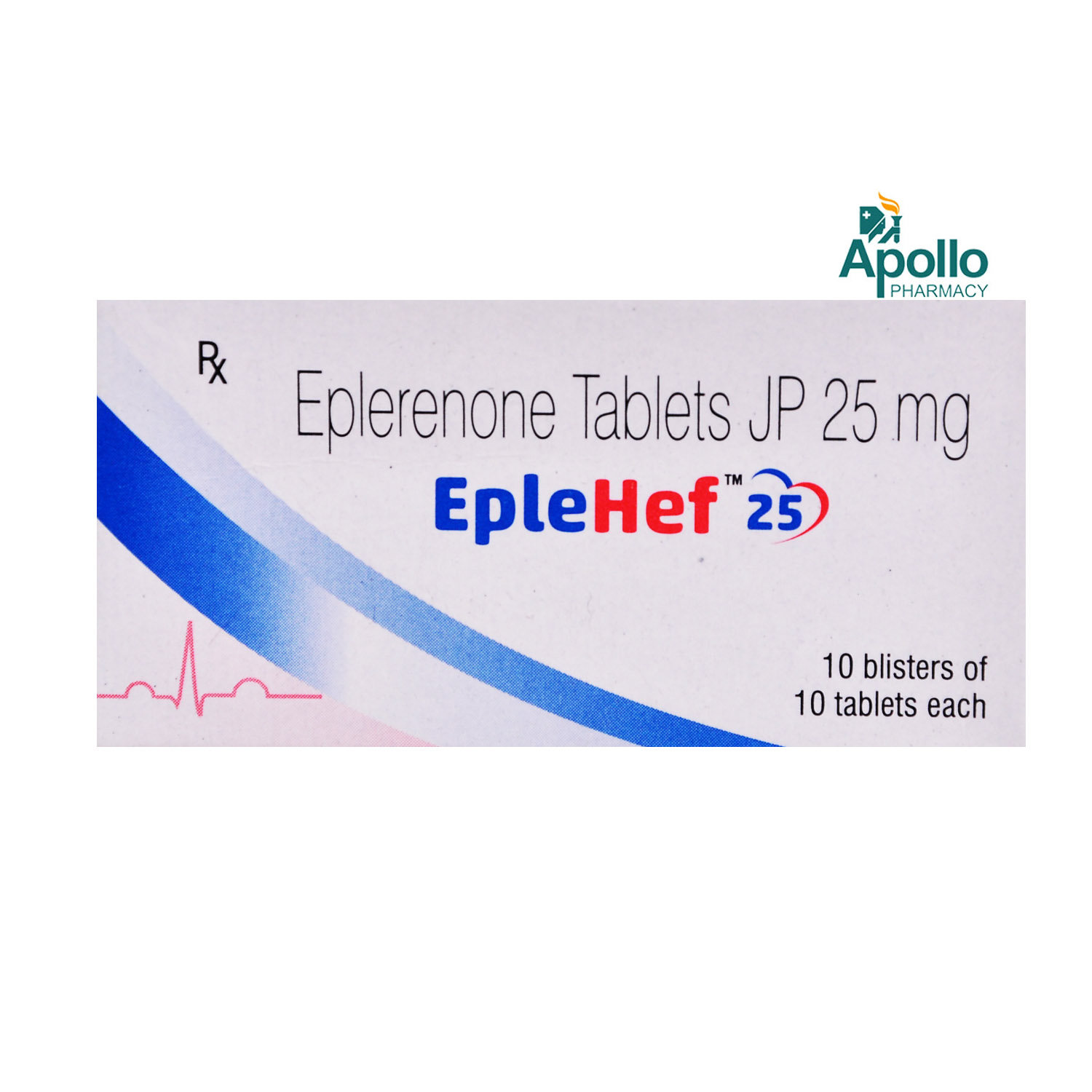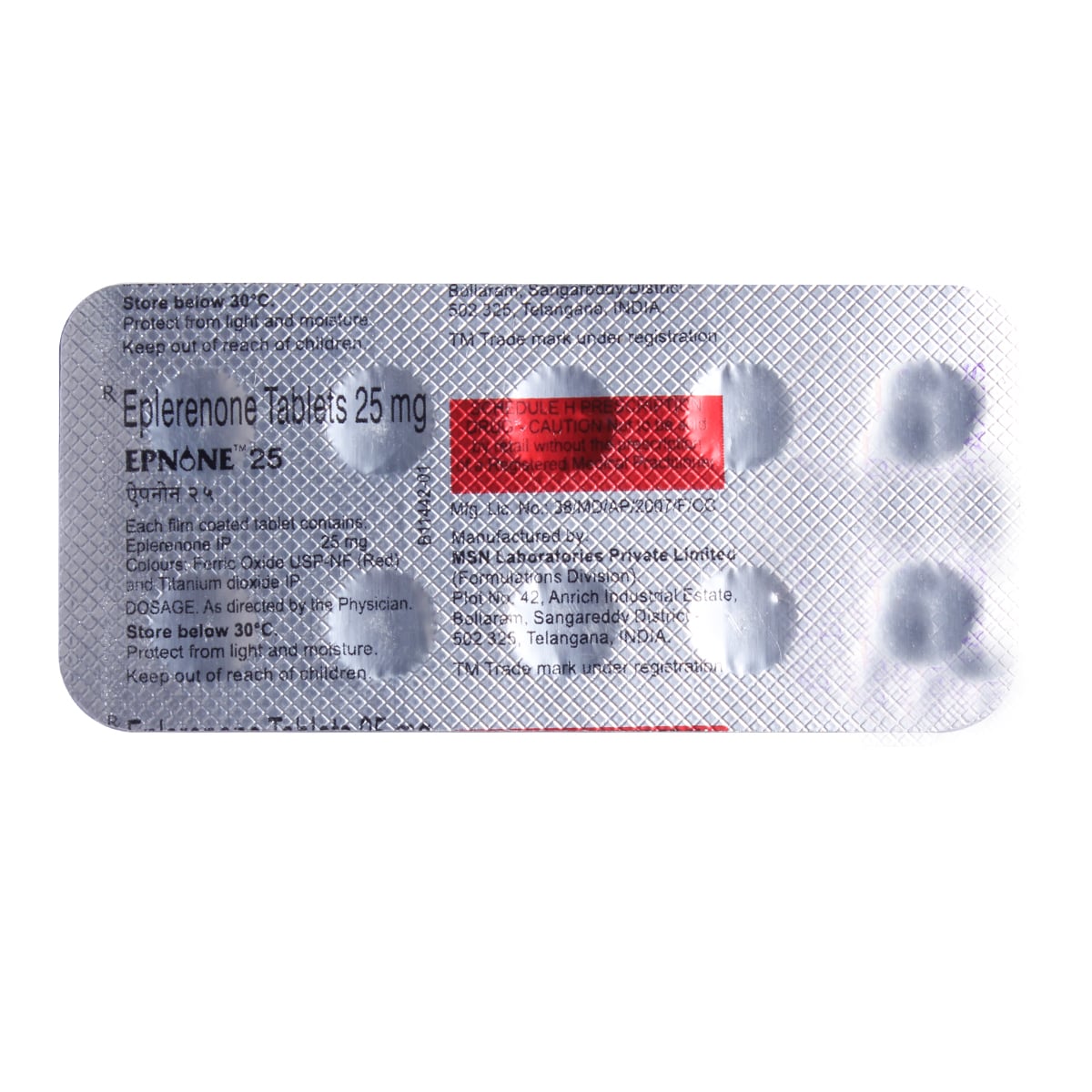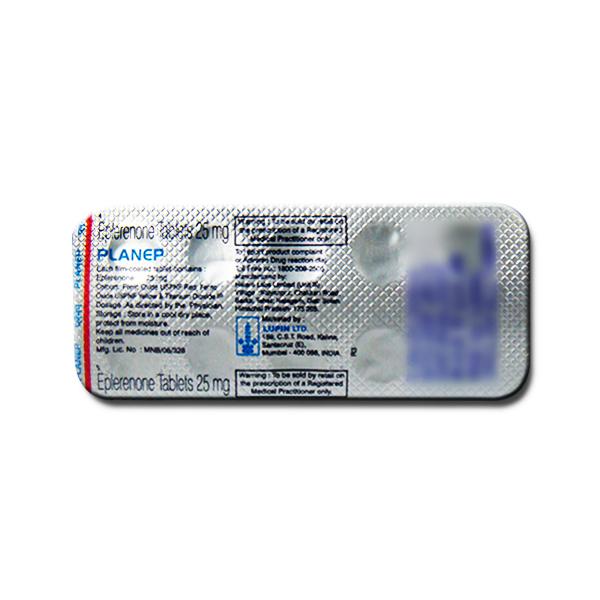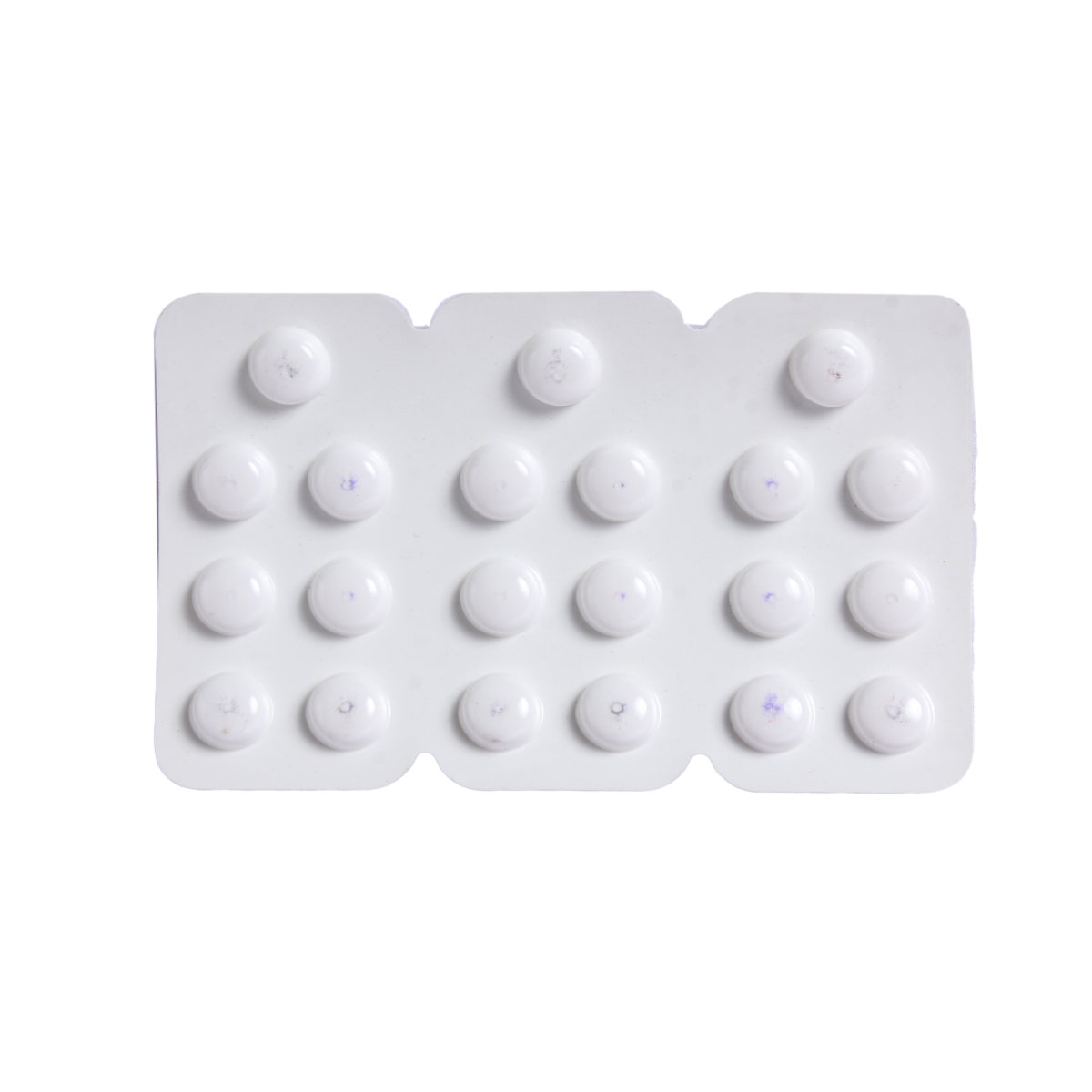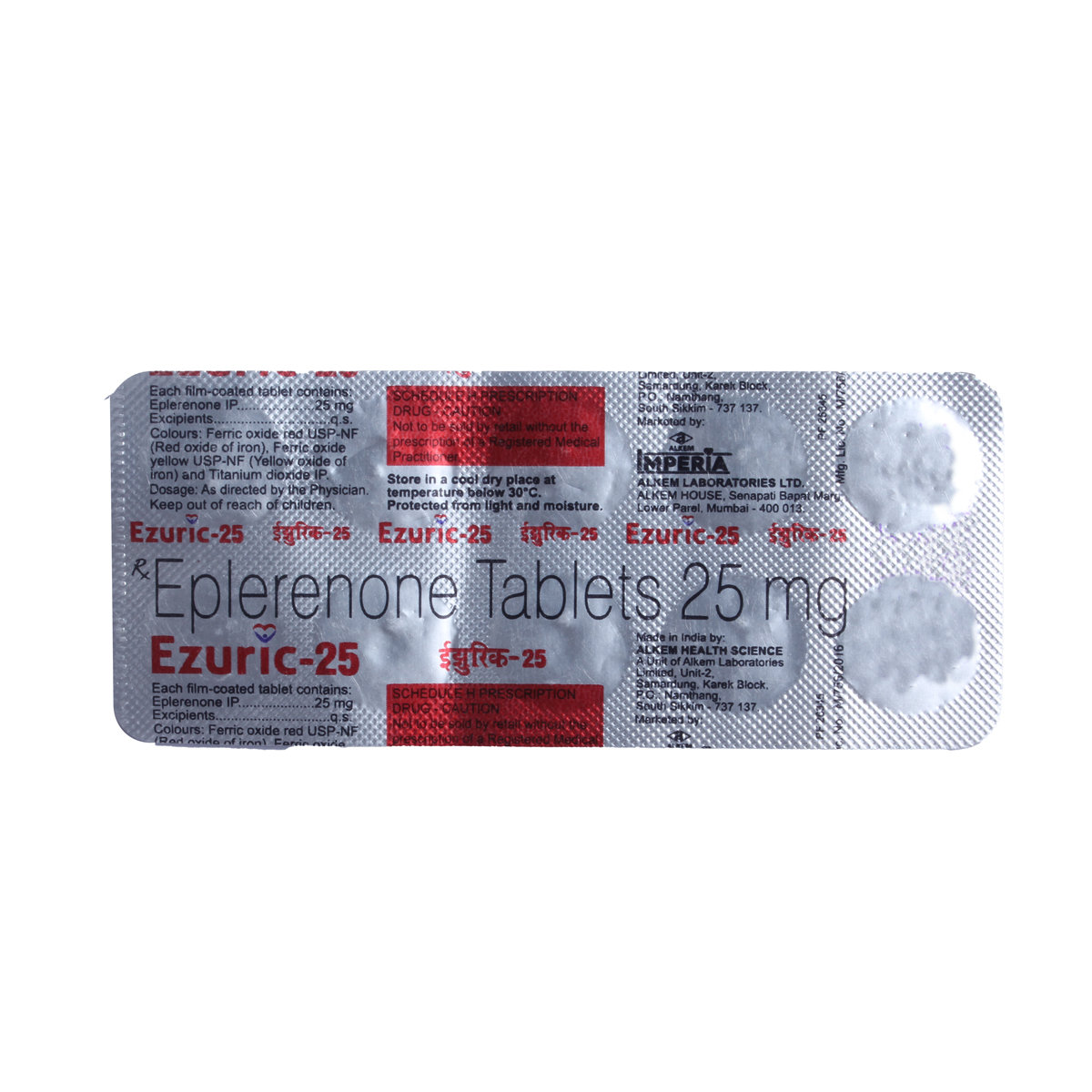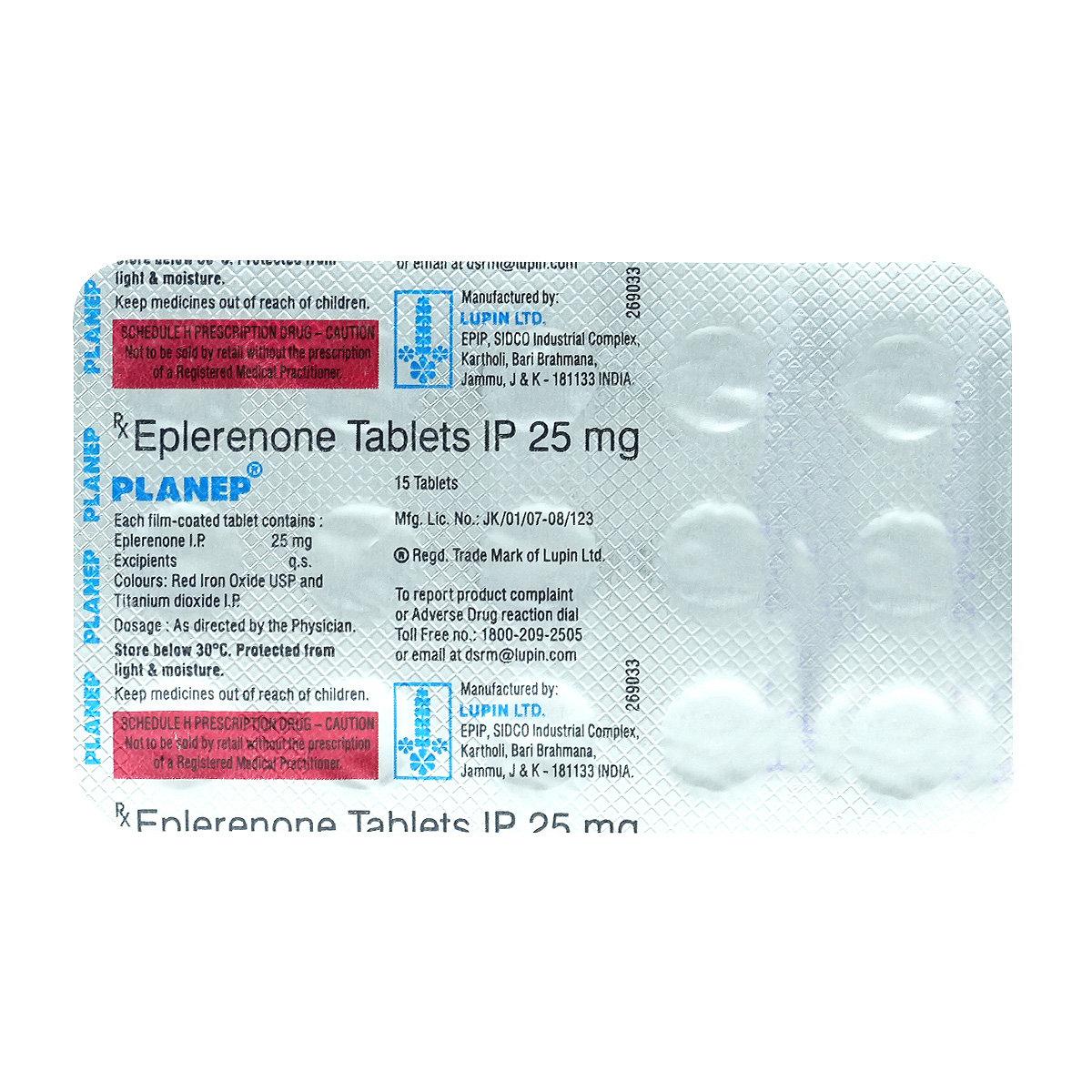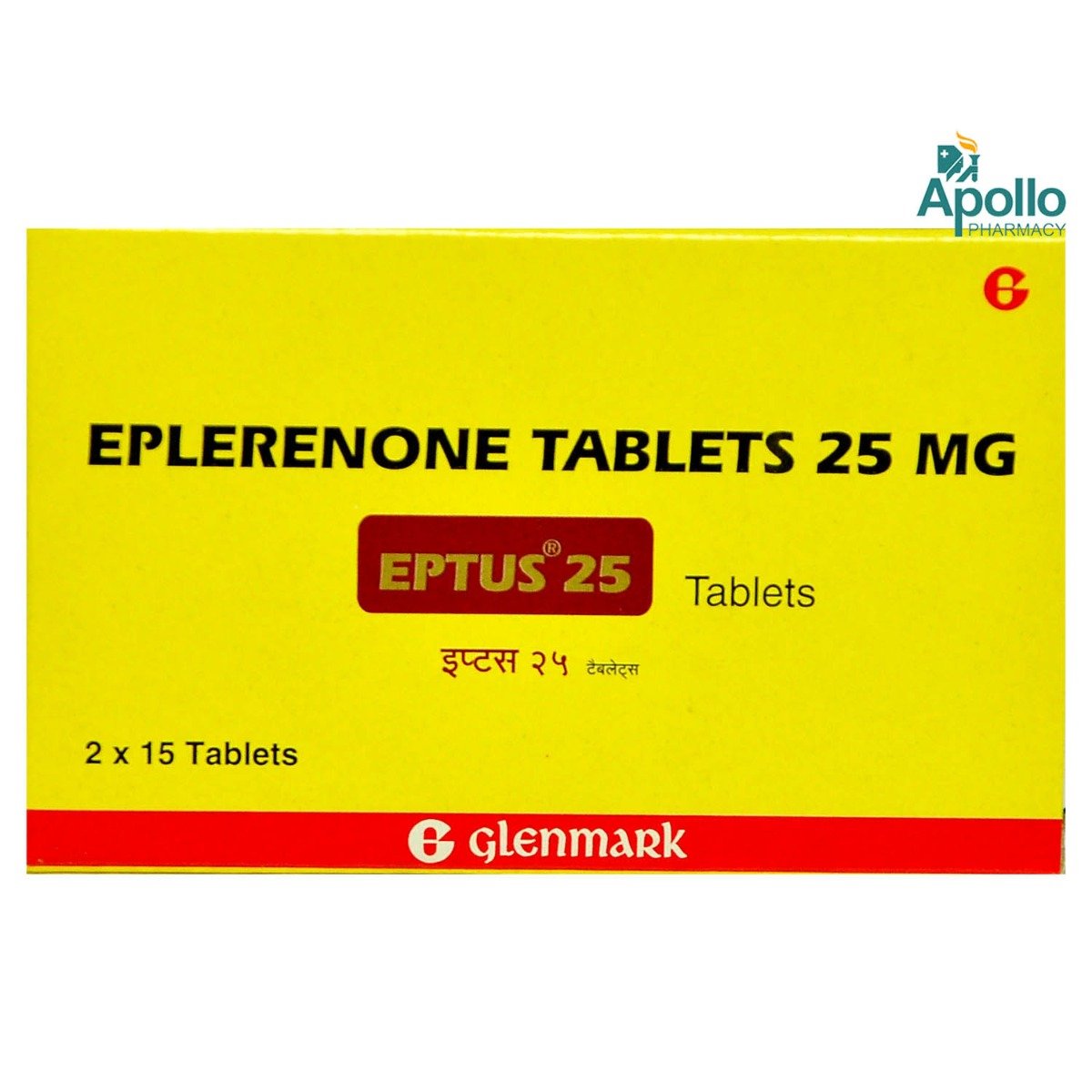Exenta 25 Tablet 10's
MRP ₹253.5
(Inclusive of all Taxes)
₹30.4 Cashback (12%)
Provide Delivery Location
Online payment accepted
 Prescription drug
Prescription drugWhats That
Composition :
Manufacturer/Marketer :
Consume Type :
Expires on or after :
Return Policy :
About Exenta 25 Tablet
Exenta 25 Tablet belongs to a class of medicine called 'diuretics' (water pills) primarily used to treat hypertension (high blood pressure). It also maintains the bloodstream's potassium level, removes excess water from the body, and prevents hypertension (high blood pressure) due to oedema (fluid retention). Blood pressure measures the force our heart uses to pump blood to all body parts. Hypertension is a chronic condition when blood pressure is too high. This condition can lead to hardened arteries (blood vessels), decreasing the blood and oxygen flow to the heart.
Exenta 25 Tablet contains Eplerenone, which is prescribed for the treatment of hypertension. Exenta 25 Tablet works by increasing the amount of urine that is passed out from the kidneys. It effectively reduces excess fluid levels in the body and the heart's workload, making it more efficient at pumping blood throughout the body. Thus, it also helps lower high blood pressure, reducing the chances of any future heart attack, stroke, or angina (chest pain) in the future.
Take Exenta 25 Tablet as prescribed by your doctor. Depending upon your medical condition, you are advised to take Exenta 25 Tablet for as long as your doctor has prescribed it for you. In some cases, you may experience dehydration, electrolyte disturbances (calcium, magnesium, and sodium), constipation, itching, and increased uric acid. Most of these side effects of Exenta 25 Tablet do not require medical attention and gradually resolve over time. However, if the side effects are persistent, reach out to your doctor.
Try not to stop taking a Exenta 25 Tablet of your own, as doing so may raise your blood pressure, thereby increasing the risk of heart disease and stroke. Inform your doctor if you have any kidney disease (with creatinine clearance less than 30 mL/min), liver disease, high serum potassium (hyperkalemia), diabetes mellitus type 2, and patients with nil urine output (anuria). If you are pregnant or breastfeeding, please tell your doctor so that the dosage of Exenta 25 Tablet can be prescribed accordingly. Please tell your doctor if you are taking any other medicines or are allergic to the Exenta 25 Tablet . Reducing the amount of table salt (sodium chloride) in your food often relieves the body's swelling. Please take Exenta 25 Tablet at least 4 hours before sleeping to avoid frequent urination at night. Also, do not take Exenta 25 Tablet along with lithium to prevent serious side effects.
Uses of Exenta 25 Tablet
Directions for Use
Key Benefits
Exenta 25 Tablet primarily used to treat hypertension (high blood pressure) and heart failure. It also treats edema (reduces swelling) caused due to other conditions. Exenta 25 Tablet works by increasing the amount of urine passing from the kidneys. It effectively reduces excess fluid levels in the body and reduces the heart's workload, and makes the heart more efficient at pumping blood throughout the body. Thus, it also helps lower high blood pressure, reducing the chances of any future heart attack, stroke, or angina (chest pain) in the future.
Storage
- Prepare for a restful night's sleep: Develop a calming pre-sleep routine, like reading or meditation, to help your body relax and prepare for sleep.
- Create a sleep-conducive Environment: Make bedroom a sleep haven by ensuring it is quiet, dark and calm.
- Follow a Sleep Schedule: Go to bed and get up at the same time every day to help regulate your body's internal clock and increase sleep quality.
- Try relaxing techniques like deep breathing, mindfulness meditation and any others.
- Limit stimulating activities before bedtime: Avoid stimulating activities before bedtime to improve sleep quality.
- Monitor Progress: Keep track of your sleep patterns to identify areas for improvement.
- Consult a doctor if needed: If these steps don't improve your sleep, consult a doctor for further guidance and therapy.
- Inform your doctor about dizziness symptoms. They may adjust your medication regimen or prescribe additional medications to manage symptoms.
- Follow your doctor's instructions for taking medication, and take it at the same time every day to minimize dizziness.
- When standing up, do so slowly and carefully to avoid sudden dizziness.
- Avoid making sudden movements, such as turning or bending quickly, which can exacerbate dizziness.
- Drink plenty of water throughout the day to stay hydrated and help alleviate dizziness symptoms.
- If you're feeling dizzy, sit or lie down and rest until the dizziness passes.
- Track when dizziness occurs and any factors that may trigger it, and share this information with your doctor to help manage symptoms.
- Hydrate your body: Drink enough water to prevent dehydration and headaches.
- Calm Your Mind: Deep breathing and meditation can help you relax and relieve stress.
- Rest and Recharge: Sleep for 7-8 hours to reduce headache triggers.
- Take rest: lie down in a quiet, dark environment.
- Cold or warm compresses can help reduce tension.
- Stay Upright: Maintain good posture to keep symptoms from getting worse.
- To treat headaches naturally, try acupuncture or massage therapy.
- Over-the-counter pain relievers include acetaminophen and ibuprofen.
- Prescription Assistance: Speak with your doctor about more substantial drug alternatives.
- Severe Headaches: Seek emergency medical assistance for sudden, severe headaches.
- Frequent Headaches: If you get reoccurring headaches, consult your doctor.
- Headaches with Symptoms: Seek medical attention if your headaches include fever, disorientation, or weakness.
Drug Warnings
Exenta 25 Tablet should not be given to the people allergic to Exenta 25 Tablet , have low blood pressure (less than 90 mm of Hg), have had a heart attack, kidney disease (with creatinine clearance less than 30 mL/min), liver disease, high serum potassium (hyperkalemia), diabetes mellitus type 2 and patients with nil urine output (anuria), pregnant women, planning to get pregnant and breastfeeding women. Exenta 25 Tablet can pass into breast milk, but its effect on the baby is unknown, so it is better to tell your doctor if you are taking Exenta 25 Tablet and breastfeeding. Dehydration with electrolyte and acid-base disturbances must be corrected before using Exenta 25 Tablet . Do not take extra potassium supplements or potassium-rich foods such as bananas and broccoli with Exenta 25 Tablet . It may lead to an excessive increase in blood potassium levels (hyperkalemia). Please take Exenta 25 Tablet at least 4 hours before sleeping to avoid frequent urination at night. Also, do not take Exenta 25 Tablet along with lithium to prevent serious side effects.
Drug-Drug Interactions
Drug-Drug Interactions
Login/Sign Up
Coadministration of posaconazole with Exenta 25 Tablet can increase the blood levels of Exenta 25 Tablet. This can increase the risk of serious side effects, including hyperkalemia (high blood potassium).
How to manage the interaction:
Although there is an interaction between posaconazole and Exenta 25 Tablet, it can be taken if a doctor has advised it. However, if you experience any unusual symptoms contact a doctor immediately. Do not discontinue any medications without consulting a doctor.
The blood levels and effects of Exenta 25 Tablet may be greatly increased when combined with itraconazole.
How to manage the interaction:
Although there is a possible interaction between Exenta 25 Tablet and Itraconazole, it is not recommended; they can be taken if prescribed by a doctor. Consult a doctor if you have complications such as hyperkalemia (high blood potassium), which in extreme circumstances can result in kidney problems, muscle paralysis, and an irregular heartbeat. Without first consulting your doctor, never stop taking medicines.
Co-administration of Exenta 25 Tablet and Ritonavir may significantly increase the blood levels of Exenta 25 Tablet.
How to manage the interaction:
Taking Ritonavir and Exenta 25 Tablet together is not recommended as it can lead to an interaction. However, it can be taken if a doctor advises it. If you experience any unusual symptoms like headaches, irritation, confusion, edema (swelling caused by too much fluid accumulation), weakness, palpitations, or constipation, consult a doctor immediately. Do not stop using any medications without a doctor's advice.
Combining Exenta 25 Tablet with Potassium iodide may significantly increase potassium levels in the blood which can lead to kidney issues, muscle paralysis (loss of muscle function) and irregular heart rhythm.
How to manage the interaction:
Although there is a possible interaction between Potassium iodide and Exenta 25 Tablet, you can take these medicines if prescribed by a doctor. Consult a doctor if you experience nausea, vomiting, weakness, disorientation, tingling in your hands and feet, feelings of heaviness in your legs, a weak pulse, or irregular heartbeat. It is essential to maintain proper fluid intake while taking these medications. Do not discontinue any medications without a doctor's advice.
Using Exenta 25 Tablet together with Potassium chloride may significantly increase potassium levels in the blood.
How to manage the interaction:
Taking potassium chloride with Exenta 25 Tablet is not recommended. You can take these medicines if prescribed by a doctor. Consult a doctor if you experience nausea, vomiting, weakness, disorientation, tingling in your hands and feet, feelings of heaviness in your legs, a weak pulse, or an irregular heartbeat, consult the doctor immediately. It is essential to maintain proper fluid intake while taking these medications. Do not discontinue any medications without a doctor's advice.
Combining Exenta 25 Tablet with Spiranolactone may significantly increase potassium levels in the blood which can lead to kidney issues and irregular heart rhythm.
How to manage the interaction:
Although there is a possible interaction between spironolactone and Exenta 25 Tablet, it is not recommended as it can lead to an interaction. You can take these medicines if prescribed by a doctor. Consult a doctor if you experience nausea, vomiting, weakness, confusion, tingling in your hands and feet, feelings of heaviness in your legs, a weak pulse, or an irregular heartbeat. It is essential to maintain proper fluid intake while taking these medications. Do not discontinue any medications without a doctor's advice.
Co-administration of EPELENONE and SAQUINAVIR may significantly increase the blood levels and side effects of Exenta 25 Tablet. This can increase the risk of serious side effects like high blood potassium, which in severe cases can lead to kidney failure, muscle paralysis (loss of muscle function) and irregular heart rhythm.
How to manage the interaction:
Taking saquinavir and Exenta 25 Tablet together is not recommended as it can lead to interaction. However, it can be taken if a doctor advises it. If you experience any unusual symptoms like headaches, irritation, confusion, edema (swelling caused by too much fluid accumulation), weakness, palpitations, or constipation, consult a doctor immediately. Do not stop using any medications without the doctor's advice.
Co-administration of Exenta 25 Tablet and Clarithromycin may significantly increase the blood levels and effects of Exenta 25 Tablet.This may increase the risk or severity of side effects like high blood potassium which can lead to kidney damage and irregular heart rate.
How to manage the interaction:
Taking Clarithromycin with Exenta 25 Tablet is not recommended as it can lead to interaction. However, it can be taken if a doctor advises it. If you experience any unusual symptoms like headaches, irritation, confusion, edema (swelling caused by too much fluid accumulation), weakness, palpitations, or constipation, consult a doctor immediately. Do not stop using any medications without the Doctor's advice.
Taking Exenta 25 Tablet with Potassium citrate may significantly increase potassium levels in the blood which can lead to kidney issues, muscle paralysis (loss of muscle function) and irregular heart rhythm.
How to manage the interaction:
Although there is a possible interaction between Potassium citrate and Exenta 25 Tablet, you can take these medicines if prescribed by a doctor. Consult a doctor if you experience nausea, vomiting, weakness, disorientation, tingling in your hands and feet, feelings of heaviness in your legs, a weak pulse, or irregular heartbeat. It is essential to maintain proper fluid intake while taking these medications. Do not discontinue any medications without a doctor's advice.
Coadministration of Nefazodone with Exenta 25 Tablet can increase the levels of Exenta 25 Tablet in the body.
How to manage the interaction:
Taking Nefazodone with Exenta 25 Tablet together is not recommended as it can result in an interaction, but it can be taken if your doctor has advised it. However, if you notice any symptoms of headaches, irritation, confusion, edema (swelling caused by too much fluid accumulation), weakness, palpitations, or constipation, you should contact a doctor immediately. Do not stop using any medications without a doctor's advice.
Drug-Food Interactions
Drug-Food Interactions
Login/Sign Up
Diet & Lifestyle Advise
- Consume antioxidant-rich food. Blueberries, cherries, tomatoes, squash, and bell peppers are highly antioxidants.
- Eat natural diuretic foods. Asparagus, beets, green beans, grapes, onion, leafy greens, pineapple, leeks, pumpkin, and garlic are all-natural diuretic foods.
- Use healthy cooking oils like soybean, olive, canola, and coconut oil.
- You should avoid refined foods such as white bread, spaghetti, sugar, and red meat.
- Reduce or eliminate Trans fatty acids, which are found in commercially baked items such as cookies, cakes, crackers, French fries, onion rings, doughnuts, and processed foods.
- Avoid the consumption of too much salt or salty food.
- Keep your weight under control with a BMI of 19.5-24.9.
- Regular physical activity or exercise like walking improves your blood flow.
- Elevate your legs or the swollen area on a chair or pillow.
- Avoid standing or sitting for extended periods.
- Avoid chronic stress, as it can raise your blood pressure.
- Spend time with your loved ones to cope with stress and practice mindfulness techniques.
- Quitting smoking and alcohol consumption is the best strategy to lower the risk of many health complications.
Side Effects of Exenta 25 Tablet
- Dizziness
- Nausea
- Dizziness
- Headache
- Cough
- Increased creatinine and potassium in the blood
- Fatigue
Habit Forming
Therapeutic Class
All Substitutes & Brand Comparisons
RX
Exenta-T 20Mg Kit (10+10) Tablet
Alembic Pharmaceuticals Ltd
₹242
(₹10.89 per unit)
51% CHEAPERRX
Eplebless 25 Tablet 10's
Mankind Pharma Pvt Ltd
₹169
(₹15.22 per unit)
31% CHEAPERRX
Out of StockEpletag 25mg Tablet
Ikon Remedies Pvt Ltd
₹175
(₹15.75 per unit)
29% CHEAPER
Drug-Diseases Interactions
Drug-Diseases Interactions
Login/Sign Up
FAQs
Drug-Drug Interactions Checker List
- METOPROLOL
- RAMIPRIL
- HYDROCHLOROTHIAZIDE
- ASPIRIN
- WARFARIN
- CARBAMAZEPINE
- PHENOBARBITAL
- CYCLOSPORINE
- IBUPROFEN
- ITRACONAZOLE
- KETOCONAZOLE
- RITONAVIR
- NELFINAVIR
- CLARITHROMYCIN
- TELITHROMYCIN
- LITHIUM
Special Advise
- Treatment with Exenta 25 Tablet requires regular monitoring of serum potassium and creatinine level.
- Monitor your blood pressure daily and if there is too much fluctuation, then immediately contact your doctor.
- Monitor your blood sugar level daily and if there is too much fluctuation, then immediately contact your doctor.
Disease/Condition Glossary
Hypertension: The blood exerts increased pressure on the walls of blood vessels leading to hypertension. High blood pressure is expressed as systolic/diastolic pressure. Systolic pressure is the pressure in the arteries when the heart beats or pumps out blood. Diastolic pressure is the pressure in the arteries between the heartbeats. Blood pressure is measured in millimetres of mercury (mmHg) by a blood pressure monitor called a sphygmomanometer. Some of the symptoms are headache, dizziness, nosebleeds, altered vision, chest pain, weakness, and shortness of breath. However, most of the time, the signs and symptoms of hypertension are none.
Oedema: Oedema, also known as fluid overload, occurs due to fluid build-up in spaces between the cells. Oedema can result from a variety of factors. Some oedema reasons are caused by your lifestyle, while an underlying medical problem causes others. Shortness of breath, chest pain (angina), abnormal heart rhythms (arrhythmia), and swelling in hands or abdominal areas are the symptoms of oedema.

Have a query?
Alcohol
Safe if prescribed
You are recommended not to consume alcohol along with Exenta 25 Tablet to avoid unpleasant side-effects.
Pregnancy
Consult your doctor
Exenta 25 Tablet should be used in pregnant women only if clinically needed, and the benefits outweigh the risks.
Breast Feeding
Consult your doctor
Breast-feeding must be avoided during treatment with Exenta 25 Tablet . It is only if prescribed by a doctor and if benefits overweigh harms.
Driving
Safe if prescribed
It is not recommended to drive after taking Exenta 25 Tablet as it may occasionally cause drowsiness due to orthostatic hypotension (sudden drop in blood pressure on standing from lying position).
Liver
Consult your doctor
Inform your doctor before receiving the Exenta 25 Tablet if you have a history of liver diseases/conditions. Your doctor may adjust your dose depending on your current kidney conditions.
Kidney
Consult your doctor
Inform your doctor before receiving the Exenta 25 Tablet if you have a history of kidney diseases/conditions. Your doctor may adjust your dose depending on your current kidney conditions.
Children
Safe if prescribed
Exenta 25 Tablet is not recommended for children below 12 years of age.
Recommended for a 30-day course: 3 Strips

